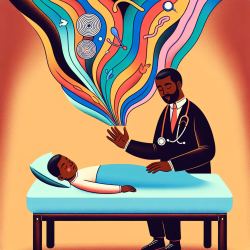Introduction
In the world of healthcare, the demand for mental health services has skyrocketed, especially in correctional facilities where the prevalence of mental illness is notably higher than in the general community. The research article titled "A Versatile Prison Psychiatric Pharmacy Program" provides a comprehensive overview of an innovative approach to psychiatric care in correctional settings, specifically at the Federal Correctional Center Butner. This blog aims to inspire practitioners to adopt data-driven strategies to enhance patient outcomes, drawing insights from this groundbreaking study.
Data-Driven Insights
The study highlights the critical role of pharmacists in bridging gaps in mental health care, particularly in correctional facilities. By practicing independently under collaborative practice agreements, pharmacists have been able to provide essential psychiatric services, including medication management and psychoeducation. The data speaks volumes: 74% of patients in the program experienced stable or improved symptoms of depression, schizophrenia, and bipolar disorder. Furthermore, 43% of patients who initially declined psychiatric medication consented to treatment after participating in psychoeducation meetings.
Implementing Change
For practitioners looking to implement similar programs, the study underscores the importance of a multidisciplinary approach. Collaboration between pharmacists, psychiatrists, psychologists, and other healthcare providers is crucial for comprehensive patient care. The program at FCC Butner serves as a model for how such collaboration can lead to significant improvements in patient outcomes.
- Independent practice under collaborative agreements
- Regular psychoeducation meetings
- Comprehensive medication management
- Interdisciplinary team collaboration
Encouraging Further Research
The success of the psychiatric pharmacy program at FCC Butner invites further research into its applicability in other correctional settings. Practitioners are encouraged to explore how similar models can be adapted to their unique environments, considering factors such as patient demographics, available resources, and existing healthcare infrastructure. By doing so, they can contribute to a growing body of evidence supporting the integration of pharmacists into mental health care teams.
Conclusion
The research presented in "A Versatile Prison Psychiatric Pharmacy Program" is a testament to the transformative power of data-driven, interdisciplinary approaches in healthcare. By adopting similar strategies, practitioners can significantly enhance mental health outcomes in correctional facilities and beyond. For those interested in delving deeper into the study, the original research paper can be accessed here.










